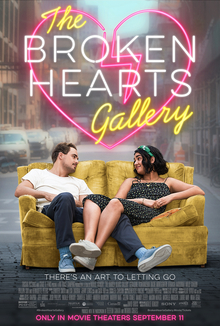‘The Broken Hearts Gallery’ represents the modern toxic obsession with love

Produced by Selena Gomez, “The Broken Hearts Gallery” tells the story of a young girl who searches for love in New York City.
September 24, 2020
Take a love obsessed, poorly written and unoriginal gallery assistant and pair her with an overly charming, stereotypical love interest that is more of a plot piece than a dynamic character, add a saccharine and overdone screenplay and throw in some plot holes and you have created “The Broken Hearts Gallery.” Not only did this film lack emotion and creativity, it also had a plot based around the obsession of love and finding a partner, an entirely toxic and sadly normalized issue.
I didn’t expect much from this movie, but even then I was disappointed. The acting lacked depth and the emotions felt fabricated. Rom-coms aren’t known for their cinematic genius, but this film failed so miserably I almost pitied it. I hated it so much I felt nauseous. I kept asking myself how on earth this film got funding; it’s so bad it’s almost funny. The film centers around the main character, Lucy (Geraldine Viswanathan), and her hyperfixation on past relationships and love. We watch as she gets dumped and consequently mourns the breakup, inspiring her to “change her life.” She creates an art gallery containing pieces from her old relationships, as the title “The Broken Hearts Gallery” suggests. The idea for the gallery started when Nick (Dacre Montgomery), her love interest, hangs her most recent ex-boyfriend’s tie on the wall. Lucy is inspired, of course, and decides to make an entire art gallery based on the same concept.
First of all, her actual gallery is terrible in terms of art. I’m aware that the critique of art contains subjectivity, but hanging items from your past relationships without providing detailed and profound perspective and background on the items themselves seems laughable. She provides a short video on a few of the items and nothing else. The fact that the film centers around a gallery that would no doubt fail in real life illustrates the lack of forethought for the writing of this film. Second of all, the idea of the art gallery itself feels incredibly misguided. Telling women to romanticize and give items from past relationships, therefore encouraging them to feel as if the pain they have experienced at the hands of men somehow makes them more valuable edges on blatant misogyny.
This film resembles nothing more than a halfhearted and ramshackle attempt to appeal to women indoctrinated with the belief that their worth comes from finding a partner. The whole “independent woman in the city searches for love” trope tries to pass itself off as feminist and inspiring when in reality the trope represents nothing more than misogynistic ideals. The idea that a woman’s identity should stem from the pursuit of love and that her entire goal in life should be to find a partner comes from the patriarchal notion that women are objects who should be desired and find enjoyment in men’s constant desire.
The personal is political, and the modern obsession with love illustrated in this film exemplifies that concept. The modern obsession with love is entirely rooted in capitalism and its oppressive nature. The provincial present dictated by capitalism means that we are encouraged to find a partner to have more kids who can buy more things. We are not encouraged to explore ourselves and our own love of life; rather, we are blatantly told in the media that our worth comes from love and marriage and family.
The nuclear family dictated by capitalism and ingrained into us by the time we can speak destructs any kind of identity we might have possessed outside of finding love. The hyperfixation on family above community and romantic love above platonic love demonstrates how skewed modern thinking is. Every facet of our media illustrates this distorted set of priorities, from the film industry to the song industry to the publishing industry.
This movie perfectly exemplifies the modern toxic obsession with love; not only did this movie fail dramatically in terms of cinematic baselines but it also encouraged women to find their worth in finding a partner. Impressionable minds consume this type of media, and it pains me to think of how many will be shaped by its misguided and destructive themes. This movie failed both its audiences and the idea of good cinema.








